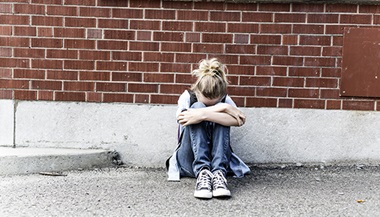Social Media and Mental Health in Children and Teens
Featured Experts
Many people, including children and teens, turn to social media for entertainment, news and connection with others. Nearly half of teens interviewed in a recent survey say they use the internet “almost constantly,” and 9 in 10 teens use social media daily. Though most social media platforms have a required minimum age of 13, almost 40% of children between the ages of 8 and 12 use social media.
Some experts believe that mental health concerns may be an unexpected side effect of increased social media use. While the link between the two is still being researched, it’s becoming more important to monitor the way children and teens use social media and its effects.
Carol Vidal, M.D., Ph.D., M.P.H., child and adolescent psychiatrist at Johns Hopkins Children’s Center, and Jennifer Katzenstein, Ph.D., co-director of the Center for Behavioral Health at Johns Hopkins All Children’s Hospital, talk about what is known of social media’s effects on mental health in children and teens.
How does social media affect mental health in children and teens?
Positive Effects of Social Media on Children and Teens
In some ways, social media can benefit mental health. For instance, it provides access to information that might be unavailable elsewhere, as well as a safe place to express oneself. Many teens find a community online that helps them through difficult times, breaking through barriers that would normally exist, such as distance or shyness in approaching others.
In addition, many children and teens can find support using social media. For instance, many social media platforms encourage help-seeking behaviors, such as:
- Helping initiate mental health care
- Affirming sexual identities
- Providing social support
- Providing a buffering effect against stress
“Social media can be used in ways that may be beneficial,” says Vidal. “For example, many children and teens may find a community that is more accepting of who they are and their identities than their immediate family or school environment. In that sense, social media can facilitate connection with peers who share interests, identities and abilities. Realistically, it is also the way many young people communicate with each other these days.”
Negative Effects of Social Media on Children and Teens
In spite of the many benefits of social media, when used in excess, there are drawbacks. The United States Surgeon General released a social media advisory in 2023 about social media and mental health. According to the advisory, evidence suggests that social media has potential to harm the mental health of children and adolescents. The advisory indicates that frequent social media use could be associated with changes in parts of the brain related to emotions and learning. Additionally, it can affect impulse control, social behavior, emotional regulation and sensitivity to social punishments and rewards.
There is also some correlation between social media use and common mental health concerns. One of the most common interrelationships is between social media and depression. “Research has demonstrated that there are high rates of depression with very low social media use and very high social media use, demonstrating that there is a ‘sweet spot’ of use for each child that is often specific to their own developmental level and protective factors,” Katzenstein says.
Social Media and Depression in Children and Teens
Recent research indicates that those who spend more time on social media tend to show more symptoms of depression. However, there could be a number of reasons for this association.
- Social isolation: Today’s children and teens spend less time connecting with friends and family in person compared with past generations. Instead, many use social media to connect, which can leave them feeling just as isolated. Online social interactions may not be as rewarding. Social media may also make some feel excluded or like they’re missing out when seeing others engage in activities and social interactions.
- Lack of healthy activities: Time spent on social media may lead to a lack of healthy activities. Physical activity and time spent outdoors help release endorphins, which can help alleviate symptoms of depression. They can also provide a sense of accomplishment and confidence.
- Lack of sleep: Research indicates that sleep deprivation is a common contributor to depression, and social media can have a notable impact on sleep. Scrolling on social media can lead to stress, which can make it hard to sleep. Additionally, people of every age can get stuck in a pattern where they only intend to look through social media for a few minutes and end up in it for more than an hour. Combine these habits with the blue light from electronic screens, which interferes with sleep patterns, and it’s easy to see how social media use before bed can lead to sleep deprivation.
“Depression is complex and has many risk factors, including a genetic predisposition, aspects of the surrounding environment and personal experiences, which are not so directly related to social media use patterns,” says Vidal. “Research is showing that those who are more depressed tend to use social media more, and vice versa. But it is not clear that the cause of depression is social media use.”
“However,” Vidal continues, “excessive social media use is associated with behaviors, such as poor sleep, increased social comparisons, impact on learning, and exposure to cyberbullying and negative content, that could contribute to the worsening of depressive symptoms.”
Further, depression and suicidality have increased as the number of people on social media, and the number of social media platforms, have increased. Katzenstein reminds us that this is correlational not causational, but it cannot be overlooked as a factor in adolescent and teen mental health.
Teaching Children and Teens to Have a Healthy Relationship with Social Media
Parents can work with their children to create healthy digital habits and encourage moderation in its use. Discussing the negative effects with children and teens to raise awareness can help manage the effects. Parents (and health providers and schools) may want to suggest the following strategies:
- Take regular breaks from digital devices.
- Turn off notifications.
- Establish phone-free hours and spaces.
- Discuss appropriate boundaries and behaviors when interacting online.
Parents can help by modeling these behaviors in their own social media use. Children and teens are more likely to emulate what they see, rather than what they are told. Fostering a healthy relationship with social media in the parents’ lives can lead to healthier habits for the family as a whole.
“Learning to have a healthy relationship with social media is as important as learning to have healthy relationships with food, exercise and coffee consumption,” explains Vidal. “Delaying the purchase of smartphones until the child is ready is a good first step. But, it is also important to instill healthy habits in children’s use of screens given that technology — and social media in particular — will be present throughout their lives.”
Katzenstein elaborates, “It’s important for us as parents to model healthy social media use and discuss social media citizenship behaviors with our children, to ensure we are not posting anything we wouldn’t say directly to someone in the ‘real world’.”
Research Shows Johns Hopkins Children’s Center Study Shows Complex Relationship Between Social Media Use and Depression in Young Adults

A study published in the International Journal of Mental Health and Addiction investigated the association among social media use, depression and other health-related behaviors of young adults over time.











